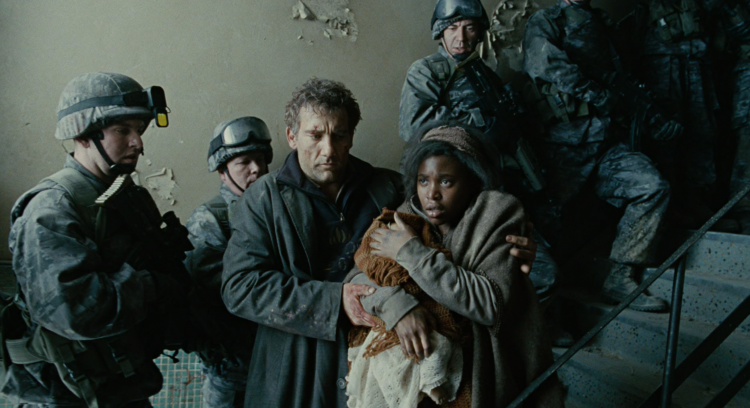
“Auteur Theory” is a column in which Aidan Bryant dives deep into the work of some of the most original filmmakers of yesterday, today, and tomorrow.
Following a recent mass shooting attempt on the subway, New York City mayor Eric Adams announced he was considering installing metal detectors in the subway. In the same week, he had the NYPD destroy homeless encampments in an effort to “clean up the streets”. When I saw these two things, my mind went to movies, as it often does. The movie I thought of was Alfonso Cuarón’s “Children of Men.” This movie is often posited as a cinematography-porn kind of film, and that is a fair reading. It is a stellar turn from one of the modern cinematographic masters, Emmanuel Lubezki, and it has some of the most beautiful one-takes I’ve ever seen. Watching this movie as a teenager, I was in awe of how the camera moved, but the story itself didn’t move me much. When I returned to it years later, I was horrified by what it showed me.
“Children of Men” depicts a future (2027 to be exact), in which human beings have been infertile for 18 years, leading to decades of war and economic depression. This has led to large-scale refugee crises, which in turn led to the rise of fascist governments which detain and kill illegal immigrants, with the UK being one of the last safe bastions standing. Now, picture how that world would look. Our view of a dystopian future is one heavily shaped by Orwell, one of gray masses, no freedom, totalitarianism. Maybe if we’re lucky we could get something like the society in the film “Brazil,” a comic yet dark bureaucracy. But that overly fantastical sci-fi future is totally different from our reality.
“Children of Men” does the opposite. Their world is not much different at face value. There are coffee shops, restaurants, gambling, and newspapers. People still go to work, but when they do they walk past a pen of illegal immigrants getting rounded up. This is barely acknowledged in the film, because it’s just normal. A dystopia is often played for fear, or laughs. It is the future we could have if we don’t change. But that future is often hyperbolized. “Children of Men” presents a future we are just a few steps away from. It is not unrecognizable. In fact, it is eerily similar to our lives right now, especially in light of the border camps in the United States and the worldwide refugee crisis. We are being confronted with exactly where we are going, not where we could be.
I can’t take credit for all of these opinions. Many of the prominent philosophers and scholars of late capitalism have commented on the film, including Naomi Klein, Slavoj Zizek, and most notably, the late Mark Fisher, who wrote about it extensively in his book “Capitalist Realism.” While theory can definitely be stuffy and boring, Fisher writes about it through a pop culture lens, and has a great understanding of how to communicate complex ideas to his audience. Let’s take a look at his writing first.
Fisher writes, “The catastrophe in “Children of Men” is neither waiting down the road, nor has it already happened. Rather, it is being lived through. There is no punctual moment of disaster; the world doesn’t end with a bang, it winks out, unravels, gradually falls apart.” This is a very common theme in the study of late capitalism, neoliberalism, whatever you like to call it; this idea of living in the end times. The first time I encountered this idea was actually through a conservative writer, Frances Fukuyama, who coined the idea of “the end of history”. Essentially saying that with the triumph of capitalism over communism with the fall of the Berlin Wall, we are now living in the final form of humanity, post-history. The cards have been dealt, and we are just waiting for everything to end.
This is radically different from the normal assumption of what would lead to a dystopian future, which, in the realm of fiction, is usually caused by an event so earth-shattering that it introduces horrors beyond our comprehension. “Children of Men” has this event, sure. The mass infertility of all humans is certainly not something I’d expect. But this event does not change our world into some mutated monster. It simply amplifies what is already there. The torture and brutality we commit agaisnt those we deem beneath us is now public rather than private. In a documentary released with the film, Zizek says, “A good portrait is more you than you are yourself. I think this is what the film does with our reality.”
The second writer I want to engage with is Naomi Klein. Klein’s most notable contribution to the current discourse is her idea of “disaster capitalism.” To explain this briefly, Klein states that capitalism is most effectively employed after a massive event, be that war, famine, or natural disasters. As a nation reels from the shock of such an event, governments can do whatever they want to your subjects. This idea was first implemented in Chile in 1973, following a US-backed coup against the socialist government of Salvador Allende. What was implemented was essentially the modern plan for capitalism, known as neoliberalism, pioneered by University of Chicago economist Milton Friedman. To boil down a very complicated idea, neoliberalism is unfettered capitalism. It streamlines it. It removes anything in its way. Once that is implemented, because change cannot come about materially anymore, change has to be cultural. Any sense of solidarity, both inter-class and interpersonal, has been removed.
“Children of Men” takes neoliberalism to its conclusion. A constant state of terror is imposed upon everyone, thus desensitizing them to the atrocities they live through. When you see pure horror everytime you leave your house, eventually you’ll get so beaten down that it won’t bother you anymore. The film takes an already horrific system and turns the dial all the way up. But this system is not imposed without giving you your goodies. Neoliberalism is not totalitarian through brute force against those who are needed as consumers. It is totalitarian in its infestation of every aspect of your life. You are thoroughly alienated, and then that alienation is sold back to you.
What sticks with me the most about “Children of Men” is its subtlety. It may not sound like a subtle movie, but it really is. Cuarón does this in “Y Tu Mama También” as well. He places upheaval and unrest intentionally in the background. But in “Children of Men” you are harshly confronted with this unrest. It is an inevitable conflict. And when it stops, even for a brief moment, it’s a feeling I can’t really describe. I love this movie for a lot of reasons. The cinematography is great, and I can sound impressive (or insufferable) by talking about how Cuarón critiques capitalism, but what I love the most is that the movie doesn’t let you go. It grabs you and pushes you around, but it’s actually talking to you. It’s opening up a dialogue. You see yourself within it, and that is a very powerful thing. “Children of Men” represents where we are headed. It’s a scary movie in that way. But I think in order to change what will happen, you need to understand how you’ve gotten where you are right now, and what has gotten us there. This movie is a step towards that.







